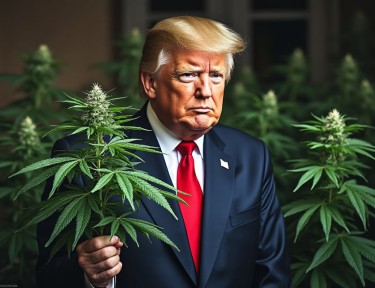
Must be sunny out today, because Republicans are flip-flopping all over the place. According to new Gallup polling, Republican support for cannabis legalization cratered from 55% in 2023 to just 40% in 2025—the lowest level in a decade. Meanwhile, 74% of Republicans believe the Trump administration is "making progress" on the illegal drug problem, up from 12% who felt that way under Biden.
Let's be clear about what happened here: Republicans didn't discover new evidence that cannabis is dangerous. They didn't read groundbreaking research changing their minds. They simply followed their leader. Trump started bombing alleged drug boats without trials or evidence, designated cartels as terrorists to bypass constitutional protections, and ramped up drug war rhetoric. Republicans, who spent decades claiming to oppose government overreach and extrajudicial killing, suddenly decided that due process is optional when their guy is pulling the trigger.
This isn't principled policymaking. This is cult behavior masquerading as politics. Twenty years ago, if a Democratic president ordered military strikes on civilian vessels in international waters based on undisclosed "intelligence" without Congressional authorization or judicial oversight, Republicans would have screamed about tyranny, constitutional violations, and the slippery slope to dictatorship. Now? They applaud death from above because Trump ordered it.
The irony is that cannabis support remains a majority position nationally—64% of Americans favor legalization despite the Republican drop. Democratic support held steady at 85%. Independents sit at 66%. The only group abandoning cannabis legalization is Republicans, and they're doing it not because the policy changed, but because their Dear Leader told them to forget what they believed last year.
The Numbers: A Nation Still Wants Legal Weed (Except Suddenly Republicans Don't)
Let's examine what the Gallup poll actually shows. Overall support for federal cannabis legalization stands at 64%—still a commanding majority, though down from the all-time high of 70% in 2023. This represents the lowest support since 2019, but it's critical to understand where that decline originated.
Democratic support: 85% in 2025, essentially unchanged from 2024 and down just slightly from the 2023 peak of 87%. Democrats haven't wavered.
Independent support: 66% in 2025, down from 72% in 2022 but relatively stable over the past three years (69% in 2023, 69% in 2024). Independents remain solidly pro-legalization.
Republican support: 40% in 2025, down from 53% in 2024 and 55% in 2023. This represents a 13-point drop in one year and a 15-point collapse from the peak. Republicans are the sole driver of declining national support.
What changed? Policy? No. Evidence? No. Trump's messaging? Absolutely. The same poll shows that 74% of Republicans believe Trump is making progress on illegal drugs, compared to just 33% of Democrats and 34% of Independents who feel that way. Republicans convinced themselves that bombing boats and tariff threats constitute effective drug policy, and simultaneously decided cannabis legalization—which they supported just two years ago—is now bad.
This correlation isn't subtle. As Republican perception of Trump's drug war success increased, Republican support for cannabis legalization decreased. The variables moved in lockstep because they're both reflections of the same phenomenon: Republicans adjusting their stated beliefs to match whatever Trump does, regardless of consistency, evidence, or principle.
The Unprincipled Politics of Extrajudicial Killing
Here's where Republican flip-flopping becomes truly grotesque. The Trump administration has conducted more than a dozen military strikes on alleged drug trafficking vessels since September, killing over 60 people whom they label "narco-terrorists." The Defense Department hasn't provided identities of those killed. They haven't presented evidence of what drugs or how much these vessels were carrying. They haven't sought Congressional authorization. They haven't obtained warrants or judicial approval. They just bomb boats based on "intelligence" we're supposed to trust blindly.
Defense Secretary Pete Hegseth posts unclassified videos of strikes on X, announcing that "intelligence confirmed" vessels were smuggling drugs along "known narco-trafficking routes." No specifics. No transparency. Just trust us—these people deserved to die.
Twenty years ago, Republicans built their entire political identity around opposing this exact behavior. They screamed about Obama's drone program. They demanded transparency and accountability for military actions. They invoked the Constitution constantly, citing checks and balances, due process, and limitations on executive power. The Tea Party movement emerged partly from concerns about government overreach and unchecked executive authority.
Now? Silence. Or worse—enthusiastic support. Because when Trump bombs civilian boats without evidence or oversight, it's not tyranny. It's "getting tough on drugs." When Trump designates cartels as foreign terrorist organizations to bypass criminal justice protections, it's not shredding constitutional rights. It's "taking the fight to narco-terrorists."
This is unprincipled politics at its most naked. There's no consistent philosophical framework here, no adherence to constitutional principles, no concern for due process or rule of law. There's only tribal loyalty: if Trump does it, it's good. If anyone else did the same thing, it would be unconscionable.
And let's address the obvious question nobody's asking: who profits from these strikes? Every missile fired costs hundreds of thousands of dollars. Every bomb dropped enriches defense contractors. Lockheed Martin, Raytheon, Northrop Grumman—they're making money hand over fist from Trump's drug war theatrics. Follow the money. These strikes aren't reducing drug availability in the U.S. They're not stopping cartels. But they are generating revenue for the military-industrial complex while providing political theater that Republicans eat up.
The Terrorist Designation: Shredding Rights by Changing Labels
The designation of cartels as foreign terrorist organizations represents one of the most dangerous expansions of executive power in recent memory, and Republicans who once claimed to fear government tyranny are cheering it on.
Here's what that designation does: it strips individuals associated with designated organizations of the legal protections normally afforded to criminal defendants. Criminal justice requires evidence, warrants, trials, convictions. Counterterrorism allows extrajudicial killing based on executive branch "intelligence" without judicial oversight.
By labeling cartels as terrorists rather than criminal organizations, Trump's administration claims authority to kill suspected cartel members without arrest, trial, or conviction. They claim authority to freeze assets without due process. They claim authority to conduct military operations without Congressional authorization. All justified by saying the magic word: "terrorist."
This should terrify anyone who values constitutional limits on government power. Because once you establish that the executive can designate people as "terrorists" and kill them without judicial oversight, there's no limiting principle. Today it's alleged drug traffickers. Tomorrow it could be anyone the administration labels dangerous. The precedent being set is that executive branch intelligence agencies—notorious for lying, manipulating evidence, and serving political agendas—can determine who lives and dies without any check on that power.
Republicans used to understand this. They used to cite the Founding Fathers about tyranny and unchecked power. They used to invoke the Constitution as sacred scripture. Now they've decided constitutional protections are optional inconveniences when applied to people they've been told are bad guys.
The individuals being killed in these strikes are, at worst, civilians engaged in criminal activity. They should be arrested, tried, and if convicted, imprisoned. That's how civilized societies with rule of law operate. Bombing them from drones because the executive branch calls them terrorists is how authoritarian regimes operate. Republicans have become enthusiastic supporters of the latter while pretending they still believe in the former.
The Broader Betrayal: When Trump Does It, Everything's Different
The collapse in Republican cannabis support is just one symptom of a broader phenomenon: Republicans abandoning every principle they claimed to hold the moment Trump told them to.
They're suddenly in favor of new wars in the Middle East after spending Trump's first term praising his reluctance to start conflicts. They're cheering bombing campaigns in Yemen and threats against Iran despite Trump campaigning on ending endless wars. They're supporting massive tariffs that raise consumer prices after decades of claiming to support free trade. They're applauding government surveillance expansion after years of privacy concerns. They're defending deficit spending that would have caused Tea Party riots under a Democrat.
The pattern is consistent: Republicans don't have principles. They have team loyalty. Whatever Trump does becomes retroactively justified, and whatever they believed before Trump did it gets memory-holed.
Cannabis legalization is particularly revealing because it's such a clear-cut example. Republicans supported legalization in increasing numbers throughout the 2010s, reaching 55% in 2023. This wasn't partisan loyalty—it was genuine policy evolution as evidence accumulated that prohibition failed and legalization worked. Then Trump ramped up drug war rhetoric and started bombing boats, and suddenly 15% of Republicans decided they were against legalization after all.
These aren't people who studied new research and changed their minds. These are people who adjust their stated beliefs to match whatever Trump signals they should believe. It's unprincipled. It's authoritarian. And it's dangerous because it means there's no limiting principle on what they'll support if Trump demands it.
The Neocon Playbook: Smearing Critics as Antisemites
The Republican establishment's response to dissent perfectly illustrates this dynamic. Tucker Carlson—hardly a progressive—faces smears of antisemitism from neoconservative Republicans because he questions unconditional support for Israeli military actions. The accusation isn't based on anything Carlson actually said. It's based on the neocon playbook that anyone questioning Israeli policy must be motivated by antisemitism rather than legitimate foreign policy concerns.
Meanwhile, ordinary Americans express discomfort with being complicit in actions resulting in massive civilian casualties, including tens of thousands of children. Rather than engaging those concerns, neoconservatives accuse critics of antisemitism, effectively shutting down debate by making dissent socially unacceptable.
This is Orwellian. Republicans spent years claiming to oppose cancel culture and defending free speech. Now they're weaponizing accusations of bigotry to silence foreign policy debate. They're using the exact tactics they condemned when progressives deployed them, because when Republicans do it, it's different. Just like extrajudicial killing is different when Trump orders it, and deficit spending is different when Trump does it, and government surveillance is different when Trump expands it.
The Sticky Bottom Line: Weed's Still Popular, Republicans Are Just Unprincipled
Cannabis legalization remains popular in America. Sixty-four percent support—including 85% of Democrats and 66% of Independents—represents commanding majority backing. The only group retreating from legalization is Republicans, and they're doing it not because policy changed but because Trump told them to.
These aren't principled conservatives reconsidering positions based on new evidence. These are unprincipled partisans whose beliefs adjust to match whatever their leader says. Twenty years ago, they opposed government overreach. Today they cheer extrajudicial killings. Twenty years ago, they demanded Constitutional limits on executive power. Today they applaud designation of civilians as terrorists to bypass those protections. Two years ago, they supported cannabis legalization. Today they oppose it because Trump ramped up drug war rhetoric.
This is fanaticism. It's dangerous because it means there's no limiting principle on what these people will support. If Trump decided tomorrow to invade Mexico, they'd justify it. If he declared martial law, they'd applaud it. If he suspended elections, they'd call it necessary. Because they don't have principles—they have team loyalty that overrides everything.
The government everyone voted for—even some on the left who convinced themselves Trump was an anti-war candidate—has delivered another betrayal of epic proportions. The "no new wars" president is launching strikes across international waters. The "constitutional conservative" party is shredding constitutional protections. The "liberty movement" is cheering extrajudicial executions.
I write this currently without fear of retaliation, but with full awareness that trajectories matter. Once Palantir has the surveillance infrastructure fully integrated and the precedent is set that executives can designate anyone as terrorists justifying extrajudicial action, even articles like this might constitute "supporting terrorism" or "endangering national security." The machinery being built doesn't just threaten drug dealers—it threatens anyone who questions authority.
Must be sunny out today, because all those Republicans are flip-flopping about. Principles abandoned, Constitution forgotten, due process optional, and cannabis legalization rejected because Dear Leader said so. Meanwhile, the majority of Americans—including most Democrats and Independents—still support legalization based on evidence, efficacy, and individual freedom. The question is whether principled policy or tribal fanaticism will ultimately prevail. Based on current Republican behavior, I'm not optimistic.







